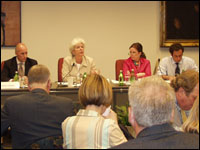Registration
You will receive an email confirming your registration.
Presenters:
Amr Hamzawy, Senior Associate, Carnegie Endowment
Marina Ottaway, Director of the Middle East Program, Carnegie Endowment
Discussant:
Owen Kirby, Political Program Manager, Office of the Middle East Partnership Initiative, Bureau of Near Eastern Affairs, U.S. Department of State
Moderator:
Robin Wright, Diplomatic Correspondent, The Washington Post
IMGXYZ714IMGZYXAmr Hamzawy and Marina Ottaway presented their paper, “Fighting on Two Fronts: Secular Parties in the Arab World,” which analyzes the shortcomings of and challenges facing Arab secular parties as they compete with restrictive governments on the one hand and popular Islamist movements on the other.
Ottaway began the discussion by noting that, although once active and influential actors in the Arab political world, secular parties are now marginalized by the domination of repressive governments and the popularity of Islamist movements. What accounts for this decline? Ottaway cited three major causes: first, secular parties find themselves stranded in the midst of a power struggle between ruling governments and popular Islamist groups; second, secular parties are out of touch with the masses and Islamist groups have laid claim to the social justice agenda once belonging to secular parties; and third, secular parties are managed by aging, stagnant leadership. These causes have not only weakened secular parties, they have also deprived the Arab world of a much-needed moderate counterweight to the possible head-on confrontation between Islamists and ruling governments. Further, these factors have deprived external actors of natural allies, making regional engagement and reform promotion difficult.
Hamzawy added that secular political ideology has been tainted by association with repressive secular governments, which have employed secular ideology in their pursuit of power since the 1950s. Changes in the regional social fabric over the past two decades have made religion a dominant force. Many Arabs are now less receptive to liberal ideology and “secular” has become a bad word in the Arab political lexicon. Despite this need for a new public image, secular parties have not presented Arab voters with a viable alternative identity. Further, secular parties face the enduring challenge of operating in a context where ruling regimes systematically obstruct their political revitalization. There is, however, still potential for success. No single Arab political actor or group has genuinely captured an overwhelming majority in the Arab world. Arab majorities have not yet truly entered the political process. Even ruling parties and Islamists have not mobilized clear majorities in the region. Thus, there remain unclaimed political supporters in the Arab world. In addition, Arab politics in general has become more dynamic and diverse, creating new spaces for political activity.
Owen Kirby emphasized that assisting secular parties is about securing choice and competition in the Arab political arena. Those hoping to see democratic openness in the region must recognize that secular parties are essential to realizing this goal. While they often operate in repressive circumstances, secular parties also bear responsibility for their own weaknesses: they lack vision and leadership, and they have not focused on the economic and social demands which Islamist groups have successfully addressed.
During the subsequent question-answer period, participants raised issues concerning secular parties’ prospects for success, the implications of Hamas’ victory over and confrontation with the secular Fatah party in the Palestinian Territories, and the effect of NGOs and civil society groups on the efficacy of secular parties.
